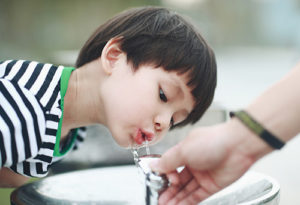Getting enough water every day is important for your health. Drinking water can prevent dehydration, a condition that can cause unclear thinking, result in mood change, cause your body to overheat, and lead to constipation and kidney stones.
Water helps your body:
- Keep a normal temperature
- Lubricate and cushion joints
- Protect your spinal cord and other sensitive tissues
- Get rid of wastes through urination, perspiration, and bowel movements

Your body needs more water when you are:
- In hot climates
- More physically active
- Running a fever
- Having diarrhea or vomiting
Most of your fluid needs are met through the water and beverages you drink. You can get some fluids through the foods that you eat – especially foods with high water content, such as many fruits and vegetables.









